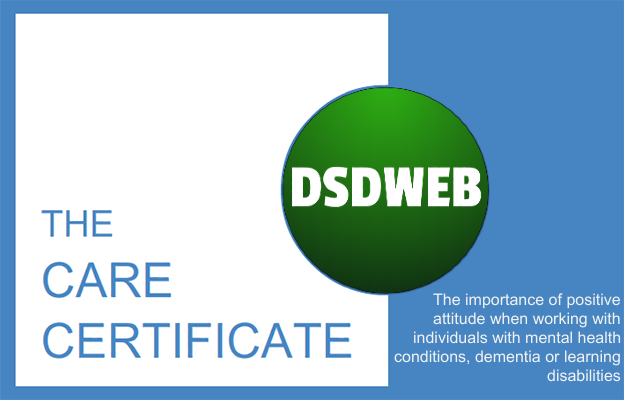This page is designed to answer the following questions:
- 9.2a. Explain how positive attitudes towards those with mental health conditions, dementia or learning disabilities will improve the care and support they receive (Care Certificate, Standard 9: Awareness of mental health, dementia and learning disability)
- 9.2b. Describe the social model of disability and how it underpins positive attitudes towards disability and involving people in their own care (Care Certificate, Standard 9: Awareness of mental health, dementia and learning disability)
NOTE: This page has been quality assured for 2023 as per our Quality Assurance policy.
Having a positive attitude toward individuals with mental health conditions, dementia or learning disabilities is essential to promote their well-being and help them to feel valued and accepted.
The medical and social models of disability
The medical model of disability is seen to be a negative view because it focuses on an individual’s impairments and looks to find treatments or cures to help an individual fit in with a society that is catered for individuals without a disability.
Conversely, the social model of disability views society as the barrier to individuals with disabilities and examines ways for society to remove the barriers that prevent individuals with disabilities from having equal life choices.
For example, if an individual has restricted mobility and uses a wheelchair, they may have difficulty getting the wheelchair out of the car when they do their shopping. The medical model would look at ways to treat or cure the individual of their disability whilst the social model would look at solutions such as creating extra-wide parking spaces at the supermarket.
The social model underpins positive attitudes towards disability because it works at removing the barriers that can limit an individual from having equal life choices and looks at what an individual’s abilities are rather than their disabilities.
The social model promotes person-centred practice by adapting an individual’s environment so that they can live as independently as possible rather than expecting the individual themselves to change.
Positive attitudes in day-to-day care work
When working with individuals with mental health conditions, dementia and learning disabilities, we should always have a positive attitude as this will improve the care and support that we provide.
Examples of being positive may include:
- building on the skills of the individual
- reducing the stigma of the conditions by ensuring individuals are not isolated in social situations
- helping others to understand the challenges of the conditions
- promoting independence
- empowering individuals to be as independent as possible
- supporting individuals to identify and pursue learning opportunities
- providing encouragement and motivation
By being positive about an individual’s abilities rather than their disabilities, you can prevent them from becoming isolated, help them to take an active role in their care and support and increase their confidence, self-esteem and well-being.

